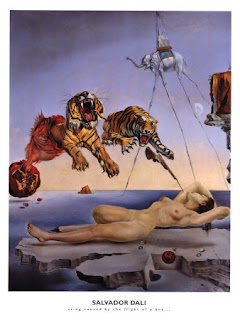 I talked to a blind guy named Ben on the bus in Denver today. He had a smooth, even baritone and his speech didn't include any "ums" or "you knows." He should've been a talk radio show host. But anyway, we were discussing the Superbowl (which had had listened to on the radio) and specifically Tom Brady's performance. At one point during the conversation, I used a visual metaphor to describe the Giants' defense, which afterward got me thinking. But first, here's how the conversation went:
I talked to a blind guy named Ben on the bus in Denver today. He had a smooth, even baritone and his speech didn't include any "ums" or "you knows." He should've been a talk radio show host. But anyway, we were discussing the Superbowl (which had had listened to on the radio) and specifically Tom Brady's performance. At one point during the conversation, I used a visual metaphor to describe the Giants' defense, which afterward got me thinking. But first, here's how the conversation went:Blind Guy Ben: There was so much pregame hype talking about how the Giants' defense would decide the game, depending on whether the front line could get to Tom Brady. But I'll give the prognosticators credit. They were right. Strahan and company did the job, and the Giants won because of it.
Me: Yeah, Strahan, Tuck and Umenyiora were all over Brady like pirahnas on a mule crossing the Amazon.
-
Blind Guy Ben: Right. Uh huh.
[awkward thirty seconds of silence.]
Blind Guy Ben: All right, this is my stop. Nice talking to you.
I was struck by his strange reaction to my (albeit pitiful) simile. It got me wondering: can blind people visualize metaphoric language? I mean, there are metaphors that deal with our different senses (i.e. sight, touch, smell, taste, sound), and there are metaphors, called synaesthetic metaphors, that mix our senses up (e.g., a sharp crack, a heavy explosion). While I'm sure blind people don't have problems with auditory metaphors, I hypothesized that Blind Guy Ben probably couldn't visualize pirahnas attacking a mule due to the fact that he lacked a reference point for the imagery.
So I went to an internet cafe and did some research, mostly on the analogous question of whether blind people have visual dreams. It turns out that it depends on when they went blind. If they've been blind from birth, they don't have visual dreams (because they don't have anything visual in their memories to recall), but if they've been blind since adolescence they generally will have visual dreams that will become hazier and fade with time.
-
There's no moral to this story, but it's probable that if you use a visual metaphor when talking to a blind guy, it's not going to help him understand your point. Although if the visual metaphor serves a conceptual purpose, it might be useful. It most likely depends on the function of the metaphor in whatever context it's being referred. For example, if the metaphor/simile functions as a joke that relies solely on imagery, it's probably going to fall flat. But if it's only purpose is to demonstrate some sort of conceptual relationship, then it'll probably be effective.
FOR FUTHER INQUIRY:
1. Raymond Carver's short story "Cathedral," where a blind guy and a non-blind guy smoke pot and the non-blind guy tries to describe a Cathedral to the blind guy.
-
2. Beethoven was deaf.
-
3. A Scholarly Study on the Dreams of Blind People

No comments:
Post a Comment